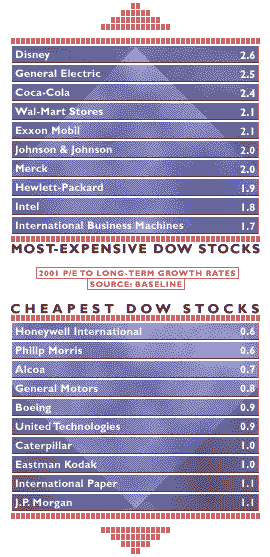|
Digesting the Dow
|
 |
July 5, 2000: 5:55 a.m. ET
The cheapest and most expensive stocks on the best-known indicator
By Staff Writer Alex Frew McMillan
|
NEW YORK (CNNfn) - Based purely on the numbers, Honeywell International and Philip Morris are the best deals on the Dow Jones industrial average. Their price-earnings estimate for next year is just over half their long-term growth rate.
But there are reasons those stocks are so cheap, just as there are good reasons General Electric, Wal-Mart Stores, Hewlett-Packard and Intel rank among the most expensive stocks on the Dow. All of those stocks are three times the price of the cheapest Dow stocks, again when you look at 2001 P/Es compared with their long-term growth.
 They all have a 2001 P/E ratio of at least 1.8 times long-term growth rate. A ratio of 1.5 is considered fairly high. They all have a 2001 P/E ratio of at least 1.8 times long-term growth rate. A ratio of 1.5 is considered fairly high.
But Hugh Johnson, chief investment officer at First Albany, points out that Dow stocks tend not to be all that expensive, even at the top of the list.
Technology as a whole comes in at a 2001 P/E to long-term growth ratio of around 1.75, he said. Even the tech stocks on the Dow are not that dear compared to that.
Hewlett-Packard, Intel and IBM are among the top-10 most expensive Dow stocks. Microsoft, beleaguered as it appeals the U.S. Department of Justice antitrust case against it, narrowly misses, at 1.6
But looking at how expensive or cheap the Dow stocks are does tell a story in almost every case, Johnson points out. General Electric Co. (GE: Research, Estimates) comes in as the second-most expensive Dow stock. That reflects its newfound perception as an e-commerce, avant-garde manufacturer and not an "old economy" industrial stock.
"That's a growth stock that is trading at an unusually high price-earnings ratio compared to growth," Johnson said. "It's being priced as a rather racy e-commerce company. They've done a really good job (of adapting to the Internet) -- that company thinks great, they have a great culture."
Some cheap stocks are there for a reason
Some general trends become clear when you look at the relative costs investors are willing to pay for Dow stocks. Basic materials companies and consumer cyclicals tend to trade at a discount, and you'll find many of them near the bottom of the list -- or the top, depending on your perspective, if you're bargain hunting.
Alcoa Inc. (AA: Research, Estimates) and International Paper Co. (IP: Research, Estimates) are good examples of basic materials companies that are cheap, Johnson said, though there are exceptions. DuPont (DD: Research, Estimates) -- full name E.I. DuPont de Demours and Co. -- is a little pricier, for instance, at a 2001 P/E to long-term growth ratio of 1.3.
"The main reason that Alcoa is cheap is that all of the stocks in basic materials are cheap," Johnson explained. "Investors have been ignoring them." Aluminum prices have been coming down, too, and so the company has found itself in a very poor pricing environment, he added.
But many of the cheapest stocks have stock-specific reasons for being there. For instance, the long-term prospects of Philip Morris Cos. (MO: Research, Estimates) are in question, Johnson said, and the company has announced plans to buy Nabisco Holdings Corp. and to reorganize.
Honeywell International Inc. (HON: Research, Estimates) took a stock-price punishing after it announced its earnings will fall short of expectations when they come out later this month.
"Usually when they're cheap, the story is not a pretty story," Johnson said.
GM may be a good buy, but hold your horsepowers
Consider the varying values of two consumer goods Dow components, Wal-Mart Stores and Procter & Gamble.
Wal-Mart Stores Inc. (WMT: Research, Estimates) comes in as the fourth-most expensive stock on the Dow, at a 2001 P/E versus long-term growth rate of 2.1, reflecting its position as a favorite long-term growth stock, despite occasional sales blips.
Procter & Gamble Co. (PG: Research, Estimates), on the other hand, has a ratio of 1.4. Its price has been battered twice due to earnings warnings, and its CEO stood down near the start of June after a year and a half.
General Motors Corp. (GM: Research, Estimates) might look like a good deal, Johnson said. It has not suffered like P&G, but still sees its price depressed as interest rates rise and consumer spending slows.
But if spending does continue to slow, GM's 2001 earnings projections may not hold up, Johnson continued. Already, the June auto sales showed a 5.5 percent decline for GM's heavy trucks and light vehicles, excluding its Saab division. That was worse than analysts expected.
At the top of the most expensive Dow stocks list sits Walt Disney Co. (DIS: Research, Estimates). Entertainment has been the only bright spot in consumer products of late, Johnson said. "Entertainment stocks have been on a tear, because there's a lot of acquisition activity," Johnson said.
He likes to look at more than just the Dow stocks to get a stronger picture of overall industry trends. But he pointed out that each of the Dow components has a story behind where it ends up on the most expensive list.
"Each case is a different story," Johnson said. 
|
|
|
|
|
|
Track your stocks
|
Note: Pages will open in a new browser window
External sites are not endorsed by CNNmoney
|
|
|
|
 |

|

